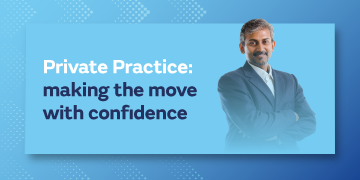A roundup and our top tips for building a successful private practice
Post date: 12/09/2022 | Time to read article: 3 minsThe information within this article was correct at the time of publishing. Last updated 12/09/2022
Author: Ian Tongue, Sandison Easson
Starting private work may seem daunting but spending the time to plan and understand how to trade in this medical sector should ensure you build a successful practice. In the last of this series, we recap on the key points to consider and provide top tips for building your private practice.
Planning
As the old saying goes, ‘failing to plan is planning to fail’. Most doctors have had limited or no financial training, so making sure you spend time at the start to get things right will ensure you’re in the best position to run your practice efficiently from both a practical and tax perspective.
The planning doesn’t stop once you are up and running, and as most practices are not sold to anyone at retirement, there is a clear life cycle. This can be viewed as three phases:
- commencement
- development
- retirement.
Commencement
Getting things right from the start is very important, so understanding your local market and the demand for your services is vital to ensure you have a viable plan.
Set out which hospitals you want to work at and develop relationships with them and GPs in the local area. If you are undertaking medicolegal work, you will need to build relationships with solicitors and agents. Remember, it can take a long time to get paid for medicolegal work, which can adversely affect your cash flow, so consider the terms and don’t just accept what is being said when it comes to payment. Many established doctors who undertake this type of work insist on favourable terms or refuse to do the work.
At commencement, it is important to have a strong team around you, and the most important person is likely to be your secretary, so choose wisely.
You must consider your private practice as a business. It seems obvious, but it can be hard to transition from an environment like the NHS where you are an employee, to patients paying to see you. It is important that your business has robust systems for the recording and payment of your time, otherwise you will end up working for free occasionally.
When it comes to an accountant, choose a medical specialist who can explain the nuances of trading in the private medical sector, and ensure you are structured efficiently.
Development
The private medical sector and tax rules are always changing, so it is important you can adapt your business to identify and take advantage of opportunities, as well as managing any threats to the business.
The composition of your work between different income streams may change as time goes on, based on available work and the work you enjoy most.
As your reputation builds, you may be asked to join groups of consultants to carry out work together. This can provide support and financial gains through cost savings and/or access to larger contracts.
As your income increases, it is likely that your exposure to pension-related tax charges will increase, as you will have higher pensionable NHS income, as well as higher overall earnings. The pension annual allowance charge has been particularly problematic for doctors, and it is extremely important that your accountant and Independent Financial Adviser (IFA), assist you in managing your position.
Retirement
Retirement can be a moving target. Expectations of retirement age change regularly and many choose to continue carrying out some level of work post NHS retirement.
At this stage, you will hopefully have built wealth and there will be a range of planning options starting to come to fruition.
Trading structure can make a big difference to exit options and it is extremely important that you are structured for tax in a way that suits your individual circumstances and plans.
With three different NHS Pension Schemes, your options can be confusing. Often the wind down of your private practice is considered in conjunction with your pension and other retirement options.
Having a medical accountant that works alongside an IFA should provide you with a team that ensures you are efficiently structured for tax. Your wealth should have built over time to ensure you and your family have the retirement you want.
Private Practice Top Ten Tips
In no particular order, here are the top ten takeaway points from this series on building a successful private practice:
- Know your market and do your research.
- Choose an efficient secretary.
- Choose a medical accountant and IFA.
- Have robust systems and record keeping.
- Understand the tax system and deadlines.
- Run your private practice as a business.
- Choose the most appropriate trading structure.
- Keep your practice under regular review and adapt to opportunities.
- Understand your pension position and pension annual allowances
- Avoid ‘too good to be true’ tax schemes.
Building a successful private practice takes time and effort, but it is achievable for doctors who want to carry out private work. Speak with colleagues and specialist advisers before you start out and make sure you have a strong team around you.
Any questions?
We hope you found the content of these articles useful. If you have financial questions or would like more advice on this topic, please contact Sandison Easson on 01625 527351.
Stay protected throughout your career
Our relationship management team are here to talk to you whenever you’re ready to add private practice protection to your membership. Find out more.
Not a member yet?
Click here to get a quote





